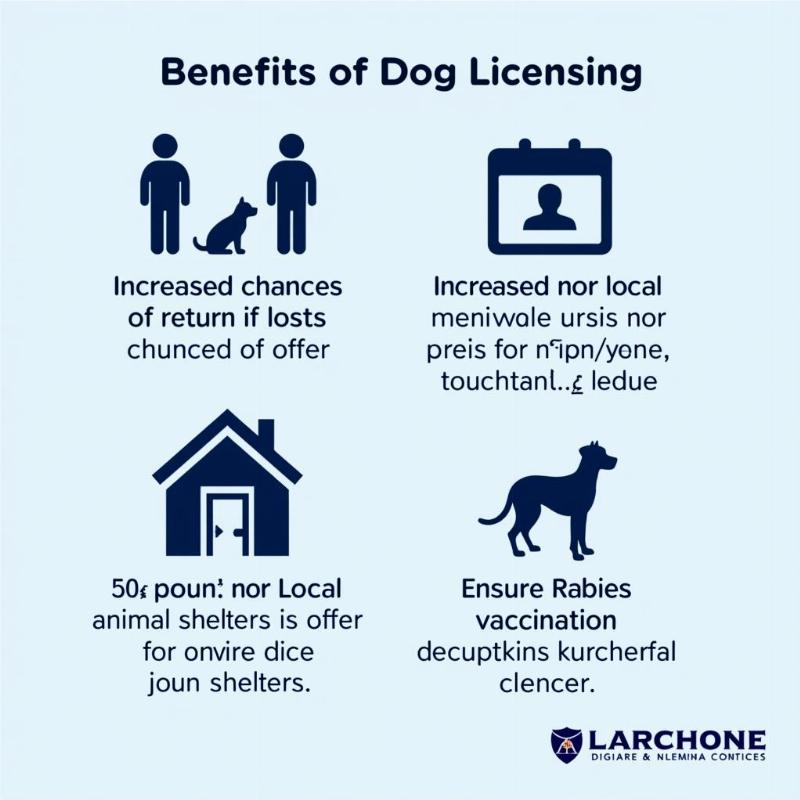Understanding the potential fines for having an unlicensed dog is crucial for responsible pet ownership in the US. Ignoring licensing requirements can lead to penalties that vary significantly depending on your location and local ordinances. So, how much can you expect to pay if your furry friend is caught without proper identification? Let’s explore the intricacies of dog licensing fees and potential fines across different states and municipalities.
Decoding Dog Licensing Fees and Penalties
The cost of a dog license itself is generally quite affordable, often ranging from $10 to $20 annually, and even less for senior citizens or owners of spayed/neutered pets. However, the penalties for not licensing your dog can be considerably higher. These fines can range from a few hundred dollars to even exceeding $1,000 in some areas, especially for repeat offenders. Additionally, some jurisdictions may impose late fees, further increasing the financial burden.
Why Do Licensing Fees and Fines Vary?
The variations in fees and fines stem from the fact that animal control and licensing are primarily managed at the local level, be it city, county, or town. Each jurisdiction establishes its own regulations, reflecting the specific needs and priorities of its community. Factors influencing these variations include the local stray animal population, the prevalence of rabies, and the resources available for animal control services. For instance, areas with a higher incidence of rabies might impose stricter regulations and heftier fines to encourage widespread vaccination, which is often a requirement for licensing.
Locating Licensing Information in Your Area
Finding the specific licensing requirements and associated fines for your area is relatively straightforward. Most local governments have websites dedicated to animal control or licensing services. A quick online search using terms like “[your city/county] dog license” will typically lead you to the relevant information. Alternatively, you can contact your local animal shelter or humane society, which can provide guidance on licensing procedures and associated costs. Remember, being proactive and obtaining a license for your dog demonstrates responsible pet ownership and helps protect your furry friend.
Beyond the Fine: The Importance of Dog Licensing
While avoiding fines is a valid concern, dog licensing is about much more than just a legal requirement. It’s a vital component of responsible pet ownership, providing numerous benefits for both your dog and the community. A license acts as your dog’s identification, increasing the chances of their safe return if they ever get lost. It helps support local animal shelters and control programs, contributing to the overall welfare of animals in your area. Furthermore, licensing often requires proof of rabies vaccination, ensuring the safety of both your pet and the public.
Addressing Common Concerns About Dog Licensing
Some pet owners might hesitate to license their dogs due to privacy concerns or the perceived hassle of the process. However, the information collected during licensing is typically limited to essential details like your contact information and your dog’s breed and vaccination status. This information is used solely for identification and public health purposes. The licensing process itself is usually quite simple, often requiring just a short application and a small fee.
 Benefits of Dog License
Benefits of Dog License
Conclusion
The fine for an unlicensed dog can be significant, varying by location and local regulations. While the cost of a license is minimal, the penalties for non-compliance can be substantial. Beyond the financial implications, obtaining a license is a crucial aspect of responsible pet ownership, contributing to your dog’s safety and the well-being of your community. Don’t hesitate to contact your local authorities or visit their websites to learn about specific licensing requirements and procedures in your area.
FAQ
- What happens if I lose my dog’s license tag? Contact your local animal control agency to obtain a replacement tag. There may be a small fee involved.
- Do I need to license my dog if it stays indoors all the time? Yes, in most jurisdictions, all dogs are required to be licensed, regardless of whether they are indoor or outdoor pets.
- How often do I need to renew my dog’s license? Typically, dog licenses are renewed annually.
- What information is required to obtain a dog license? Generally, you’ll need proof of rabies vaccination and your contact information.
- What if I move to a different city or county? You’ll need to obtain a new license in your new place of residence.
- Are there exemptions to dog licensing requirements? Some jurisdictions may offer exemptions for service animals or certain breeds. Check with your local authorities.
- Can I be fined if my dog is wearing a license tag from a different state? No, you will need a license from your current state of residence.
Related Articles
- lorain county ohio dog license
- wayne county ohio dog license
- licking county ohio dog license
- why do i need a dog license
- city of long beach dog license
Beautdogs.us is your premier resource for all things dog-related in the US. We offer expert advice on dog breeds, care, and products, catering to both novice and experienced dog owners. Our platform connects you with valuable resources, empowering you to provide the best possible care for your furry companion. For personalized guidance and support, reach out to us at [email protected] or call +1 501-555-7529. Beautdogs.us is committed to helping you navigate the joys and responsibilities of dog ownership.